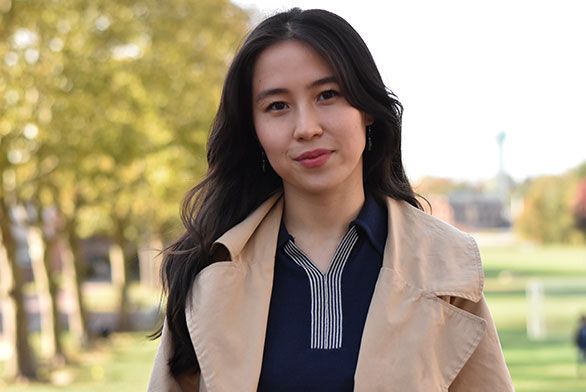Fighting Stigma—and a Language Barrier—in Kyrgyzstan
November 28, 2023 | By Kirstin Fawcett
Zeinep Ibragim Kyzy’s (A24) Projects for Peace grant proposal was personal: her 14-year-old brother, Urmat, has autism spectrum disorder (ASD), and knowledge of the neurological disorder is scarce—and stigma rampant—in her home country of Kyrgyzstan. One contributing factor for this is a lack of educational literature in the Kyrgyz language; typically it is in Russian, which is spoken primarily by an elite minority.

The disparity means that many parents with kids who have ASD “don’t really know what to do with their children,” says Kyzy, who in spring 2023 was awarded a prestigious $10,000 grant through Middlebury College to launch a self-directed summer project that promotes global tolerance and understanding. “They don’t know what sorts of activities they can do with them. And many children don’t know about ASD, so those who have the condition end up going to schools where the other students don’t understand them. There’s a barrier—because of the language.”
Kyzy spent most of summer 2023 in Kyrgyzstan closing this education gap, using her Projects for Peace funding to establish a grassroots organization called the Autism Awareness Society (AAS). The group maintained a social media and web presence, hosted weekly meetings in Kyrgyz for parents/guardians of children with ASD, collaborated with authors to publish two short children’s books in Kyrgyz, and distributed these easy-to-read materials among rural schools and libraries with help from the country’s Ministry of Education and Science. Kyzy had just three months to lay the groundwork for these initiatives, but she’s already planning for the AAS’s future and envisions it someday running as a self-sustaining nonprofit.
Projects for Peace was founded in 2007 by philanthropist Kathryn Wasserman Davis through the Davis United World College Scholars Program and is today administered annually by Middlebury to around 125 college students, all of whom are nominated for the award through a partnering institution. These projects can transpire anywhere in the world, so long as they are community-focused, scalable, and target “the root causes of conflict among parties,” according to Middlebury—which, interpreted by Kyzy, was a lack of education.
Prior to learning about Projects for Peace through Jaime Dunn, director of the college’s Office of Career Development in Annapolis, Kyzy volunteered at children’s homes for kids with disabilities and engaged in smaller-scale advocacy projects in Kyrgyzstan. Her family documents Urmat’s day-to-day life on Instagram to some 20,000 followers, and her parents, both of whom work as journalists, use their platforms to lobby for increased disability rights and protections. Given these experiences, drafting a Projects for Peace proposal—a time-intensive process for which she had to be nominated by St. John’s—was fundamentally “very easy for me, because I was so connected to the cause,” Kyzy says. “When they asked me about what inspired me, I knew straight away.”
Kyzy sought a Projects for Peace grant knowing she wanted increased visibility for ASD in Kyrgyzstan. Considering an estimated 20,000 children in Kyrgyzstan have it—a far greater number than the nation’s reported rate of 630 children—she identified a pressing need. But since launching the AAS, Kyzy’s ambitions have widened beyond public awareness to include public policy. At one point last summer, the group sponsored an open-floor discussion on disability rights attended by prominent Kyrgyz politicians and activists, and Kyzy heard from participants firsthand on how the country lacked laws ensuring equal protections for children with ASD in schools and other public places. Post-St. John’s, Kyzy plans on attending law school and hopes to someday work pro bono for nonprofits, and for the AAS to someday branch into legislative work in Kyrgyzstan.
“I know that this is going to be a lifelong project for me,” Kyzy says. “And I’m just really excited that [with Projects for Peace], I’m getting a head start now.”

